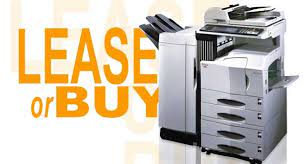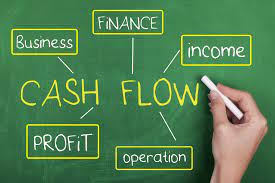In the modern business landscape, efficient document management is a cornerstone of productivity. Central to this process is the choice between copier leasing vs. buying. Both options offer distinct advantages, but which is the right fit for your business? In this article, we will explore the pros and cons of copier leasing and buying, helping you make an informed decision that aligns with your business needs.
1. Copier Leasing:
a. Lower Initial Costs: One of the primary benefits of leasing a copier is that it requires minimal upfront capital. This is particularly advantageous for businesses with budget constraints or those looking to preserve their capital for other investments.
b. Predictable Costs: Copier equipment leases typically come with fixed monthly payments, making it easier to budget and manage your office equipment expenses.
c. Regular Upgrades: Leasing agreements often include provisions for upgrading to the latest copier models, ensuring that your office stays equipped with the latest technology.
d. Maintenance Included: Many lease agreements include maintenance coverage and servicing, reducing downtime and ensuring your copier operates optimally.
e. Tax Deductions: In many cases, copier lease payments can be tax-deductible as a business expense.
2. Copier Buying:
a. Ownership: Buying a copier means you own the equipment outright. This almost immediate ownership provides a sense of ownership and control over the asset.
b. No Ongoing Payments: Once you’ve the existing lease and purchased the copier, you’re free from monthly lease payments. This can be cost-effective in the long run.
c. Customization: You have the freedom to choose the copier that best suits your specific needs and budget without being limited by any lease or buy agreements.
d. Long-term Investment: If your copier has a long lifespan and you don’t require frequent upgrades, buying may offer more value over lease period of time.
e. No Lease Restrictions: You aren’t bound by the lease agreement or terms and conditions, offering greater flexibility in how you use and maintain the copier.
3. Considerations for Your Business:
When deciding between copier leasing and buying, consider the following factors:
a. Budget: Assess your budget constraints and cash flow. Leasing leased equipment may be preferable if you need to preserve capital or require predictable monthly expenses.
b. Usage: Analyse your business’s copier usage. If your office requires high-volume, frequent printing, owning a commercial copier yourself may be more cost-effective in the long term.
c. Technological Advancements: Evaluate the rate of technological change in the copier industry. If advancements are rapid, leasing can help you stay up to date with the latest features and capabilities.
d. Maintenance Needs: Consider the maintenance and servicing requirements of the printer outright the copier. If maintenance costs are a concern, leasing may be a more attractive option.
e. Tax Implications: Consult with a financial advisor or accountant to understand the tax implications of leasing versus buying based on your business’s financial structure.
4. Making the Decision:
Ultimately, the decision between copier leasing and buying should align with your business’s unique requirements and financial considerations. It’s essential to conduct a thorough cost-benefit analysis and consider your long-term business copier and needs.
If your business values flexibility, the latest technology, and predictable expenses, leasing office copier may be the right choice. If ownership, customization, and long-term cost savings are your priorities, buying a copier may be more suitable.
What are Leasing Companies?
Leasing companies, also known as lease providers or lessors, are financial entities that offer businesses the option to lease, rather than purchase, assets such as equipment, vehicles, machinery, or technology. They facilitate leasing agreements where the lessee (the business) pays regular, monthly lease fee and payments for the use of the asset.
Copier Leasing vs. Buying: The Advantages of Leasing Company:
a. Preservation of Capital: Leasing allows businesses to preserve their capital for other strategic investments, such as marketing, expansion, or research and development.
b. Reduced Initial Costs: Leasing often requires minimal upfront costs, making it accessible to businesses with limited budgets.
c. Tax Benefits: Lease payments are generally considered a deductible business expense, offering potential tax advantages.
d. Flexibility: Leasing agreements can be tailored to suit the specific needs of a business, allowing for flexibility in terms of equipment upgrades, various lease term durations, and payment structures.
e. Access to Latest Technology: Leasing companies frequently offer the latest, cutting-edge equipment and technology, ensuring that businesses stay competitive.
What is Cash Flow?
Cash flow is the movement of money into and out of a business over a specific period. It encompasses all the cash-related activities, including revenue, expenses, investments, and financing. Cash flow can be categorized into three primary areas:
a. Operating Cash Flow: This includes the revenue generated from a company’s core operations and the costs associated with them.
b. Investing Cash Flow: It comprises cash flows related to capital expenditures, acquisitions, and investments in assets.
c. Financing Cash Flow: This involves cash flows related to debt, equity, and dividend transactions.
Copier Lease
In the fast-paced world of business, effective document management is a critical element of success. A copier is an essential tool for most offices, but the decision of whether to lease or purchase one can be a significant one. Copier leasing offers a cost-effective and flexible solution that can streamline office efficiency while saving money.
Lower Initial Costs:
One of the primary advantages of copier and printer leasing is that it requires minimal upfront capital. This is particularly beneficial for businesses with budget constraints or those looking to preserve their capital for other essential investments.
Lease Agreements
Lease agreements are the foundation of various industries, enabling individuals and businesses to access essential assets and properties without the burden of ownership. Whether it’s leasing equipment, a vehicle, a commercial space, or even a residential property, understanding lease agreements is paramount for a successful and mutually beneficial arrangement.
Fair Market Value:
Fair market value (FMV) is the price at which an asset would change hands between a willing and knowledgeable buyer and a willing and knowledgeable seller in an open and unrestricted market. It is neither an inflated nor a deflated price but rather the value established by the forces of supply and demand in a competitive market.
The Significance of Lease Agreements:
Lease agreements serve several pivotal purposes:
a. Legal Foundation: They provide a legal foundation for the end of the lease between lessor (owner) and the lessee (renter), outlining the conditions for using the asset or property.
b. Clarity and Expectations: Lease agreements set clear expectations, helping prevent misunderstandings and disputes.
c. Dispute Resolution: In the event of conflicts or disagreements, lease agreements offer a framework for dispute resolution.
d. Compliance: They ensure that both parties adhere to legal and regulatory requirements.
In conclusion, the decision between copier leasing and buying is not one-size-fits-all. The right choice depends on your business’s financial situation, operational needs, and future plans. By carefully evaluating these factors, you can make an informed decision that ensures efficient document management and supports your business’s growth and productivity.




Recent Comments